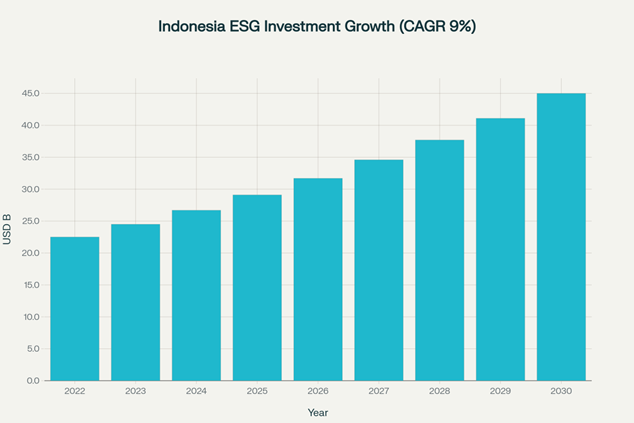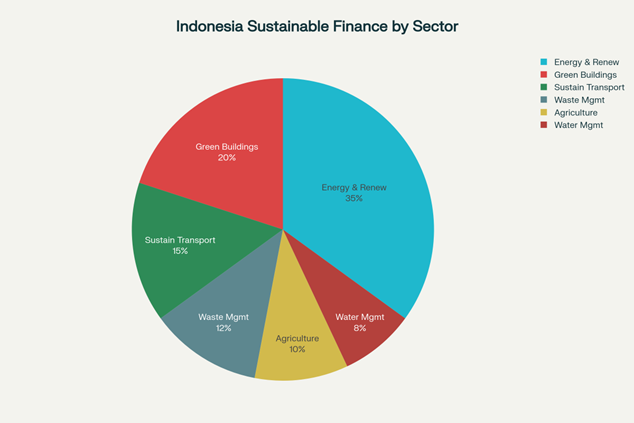


Indonesia’s ESG Investment Market Growth Projection (2022-2030)
Indonesia stands at a pivotal moment in its economic transformation, where sustainable business practices are no longer optional but essential for long-term investment success. With the world’s fourth-largest population and Southeast Asia’s largest economy, Indonesia is rapidly emerging as a global leader in Environmental, Social, and Governance (ESG) investing, creating unprecedented opportunities for forward-thinking investors and businesses.
The convergence of government policy support, rising consumer awareness, and international investment trends has positioned sustainable business setups as the cornerstone of Indonesia’s economic future. As traditional business models face increasing scrutiny from investors, regulators, and consumers, sustainable enterprises are demonstrating superior resilience, profitability, and growth potential in the Indonesian market.
Indonesia’s commitment to sustainable development is driving a remarkable transformation in its business landscape. The Indonesian Financial Services Authority (OJK) has established comprehensive frameworks that position the country as a regional pioneer in sustainable finance. Through the Sustainable Finance Roadmap Phase II (2021-2025), Indonesia has created a systematic approach to integrating ESG principles across all sectors of its economy.[1][2][3]
The introduction of the Indonesia Green Taxonomy (THI) in 2022 marked a watershed moment for sustainable business development. This comprehensive classification system, covering 2,733 economic sectors and subsectors, provides clear guidelines for businesses and investors to identify genuinely sustainable activities. The taxonomy serves as both a policy tool and an investment guide, ensuring that capital flows toward projects that deliver real environmental and social benefits
Indonesia’s sustainable investment market is experiencing explosive growth, with projections indicating the market will reach approximately USD 45 billion by 2030, growing at a compound annual growth rate (CAGR) of over 9%. This growth is fueled by multiple factors including increased ESG fund inflows, expansion of sustainable infrastructure, rising corporate participation, and regulatory mandates promoting green finance.
The green bond market in Indonesia has already reached USD 2.9 billion, positioning the country as the third-largest green bond market in ASEAN. The government’s issuance of sovereign green sukuk (Islamic bonds) has demonstrated strong investor appetite, with deals being heavily oversubscribed and attracting international capital.

The Indonesian government’s comprehensive support for sustainable business development creates an enabling environment for ESG-focused enterprises. Key government initiatives include:
OJK Sustainable Finance Regulations
The Financial Services Authority has implemented OJK Regulation No. 51/2017 concerning the Implementation of Sustainable Finance, requiring financial institutions, issuers, and public companies to integrate ESG considerations into their operations. This regulation mandates sustainable finance action plans and establishes environmental and social management policies across the financial sector.
Indonesia Taxonomy for Sustainable Finance (TKBI)
The latest version of TKBI, launched in February 2024, provides a comprehensive framework for classifying sustainable economic activities. The taxonomy covers economic, environmental, and social aspects, serving as a guide for capital allocation and sustainable financing to support Indonesia’s Net Zero Emissions (NZE) targets by 2060.
Tax Incentives and Financial Support
The Ministry of Finance offers substantial tax incentives for sustainable energy investments, including:
Unilever Indonesia: ESG Leadership in Consumer Goods
PT Unilever Indonesia Tbk exemplifies successful sustainable business implementation, earning recognition as “The Best Listed Company Based on ESG Score” at the 2024 CSA Awards. The company has demonstrated exceptional performance across four sustainability focus areas: climate, nature, plastics, and livelihoods.
Unilever Indonesia achieved an impressive 89.45% reduction in carbon emissions between 2015-2023 and successfully collected and processed 56,159 tons of plastic waste in 2023, exceeding the volume of plastic used in its product packaging. The company’s commitment to regenerative agriculture includes sourcing tea for SariWangi with Rainforest Alliance certification and supporting approximately 35,000 farmers through sustainable supply chain programs.
Indonesia’s major banks are pioneering sustainable finance practices. Bank BNI has established a green portfolio worth Rp 176.6 trillion, covering renewable energy, sustainable land management, and pollution prevention. The bank became the first in Indonesia to use the SPKLU Partnership Investor Own Investor Operate (IO2) cooperation scheme with PLN for electric vehicle charging infrastructure.
Bank Mandiri offers comprehensive ESG financing solutions including Sustainability-Linked Loans, Transition Financing, and Green Loans. The bank actively supports the renewable energy ecosystem through electric vehicle financing and solar energy promotions, particularly targeting retail segments
Rising Consumer Demand for Sustainable Products
Indonesian consumers are increasingly prioritizing sustainability in their purchasing decisions. A growing number of environmentally conscious consumers prefer to support businesses demonstrating genuine commitment to environmental and social responsibility. This shift in consumer behavior creates significant market opportunities for sustainable businesses.
Access to Green Finance
Sustainable businesses in Indonesia enjoy preferential access to various financing mechanisms:
Risk Mitigation and Resilience
Sustainable businesses demonstrate superior resilience to economic shocks, regulatory changes, and market volatility. ESG practices help companies:
Renewable Energy Sector
Indonesia possesses 40% of the world’s geothermal resources and significant solar and wind potential. The government targets 23% renewable energy in the energy mix by 2025 and 31% by 2050. Investment opportunities include:
Green Buildings and Infrastructure
The construction sector represents a major opportunity for sustainable business development. Green building practices using eco-friendly materials, energy-efficient designs, and water conservation measures can significantly reduce environmental impact while providing cost savings. The government’s green building certification programs offer additional incentives for sustainable construction projects.
Circular Economy and Waste Management
Indonesia’s waste management challenges create substantial opportunities for innovative sustainable solutions. The application of 3R principles (Reduce, Reuse, Recycle) and circular economy models can transform waste into valuable resources. Successful companies are developing partnerships with waste management organizations and investing in recycling facilities.
ALSO READ: SPT Tahunan for Indonesian SMEs in 2025: Complete Filing Guide with Coretax System
ALSO READ: ESG 101: Why Sustainable Business Setup is the Future of Indonesia Investment
ESG Reporting Mandates
The Indonesia Stock Exchange (IDX) has formalized ESG reporting requirements, with 94% of IDX-listed companies publishing sustainability reports by the end of 2024. Companies must file the E020 form as part of their annual disclosure, making ESG performance scrutiny equivalent to financial health assessment.
International Standards Alignment
Indonesia is aligning its sustainable finance frameworks with international standards including:
Net Zero Emissions Target 2060
Indonesia’s commitment to achieving Net Zero Emissions by 2060 creates a massive investment opportunity estimated at USD 285 billion by 2030. The financing gap of approximately USD 146.4 billion presents significant opportunities for private sector investment in sustainable projects.
Digital Technology Integration
Emerging technologies are revolutionizing sustainable business practices in Indonesia. Blockchain deployment in palm oil and mining sectors enables traceable, ethical sourcing. Artificial intelligence is becoming indispensable for real-time carbon footprint analysis and proactive emissions management.
Supply Chain Due Diligence
Global regulations from the EU and US requiring full supply chain visibility create opportunities for Indonesian companies to demonstrate compliance from source to shelf. This trend toward transparency and accountability benefits businesses with robust ESG practices.
The sustainable business setup process in Indonesia follows a structured approach that ensures compliance with regulations while maximizing investment opportunities. Understanding this process is crucial for entrepreneurs and investors looking to capitalize on Indonesia’s green economy transformation.
Strategic Planning and Market Entry
Successful sustainable business setup begins with comprehensive market research and strategic planning. Companies must identify their target markets, understand local regulations, and develop clear ESG objectives aligned with Indonesia’s national sustainability goals.
The Indonesian government provides extensive resources and support for sustainable businesses through multiple agencies:
Indonesia’s sustainable business landscape represents one of the most compelling investment opportunities in Southeast Asia today. With government support, regulatory frameworks, growing consumer demand, and access to green finance, sustainable businesses are positioned to deliver superior returns while contributing to national development goals.
The convergence of environmental necessity, economic opportunity, and policy support creates an unprecedented window for sustainable business investment in Indonesia. Companies that act now will establish competitive advantages that will compound over time, while those that delay risk being left behind in an increasingly sustainability-focused marketplace.
Our comprehensive Free ESG Assessment will help you identify specific opportunities for your business to thrive in Indonesia’s growing sustainable economy.
Take Action Today: Get Your Free ESG Assessment
Don’t miss out on the biggest investment opportunity of the decade. Our expert team will provide you with:





Limited Time Offer: The first 50 businesses to request their Free ESG Assessment will also receive a complimentary 30-minute strategy consultation with our Indonesia sustainable business experts.
[GET YOUR FREE ESG ASSESSMENT NOW →]
Transform your business vision into sustainable success in Indonesia’s booming green economy. The future of profitable, responsible business starts today.
